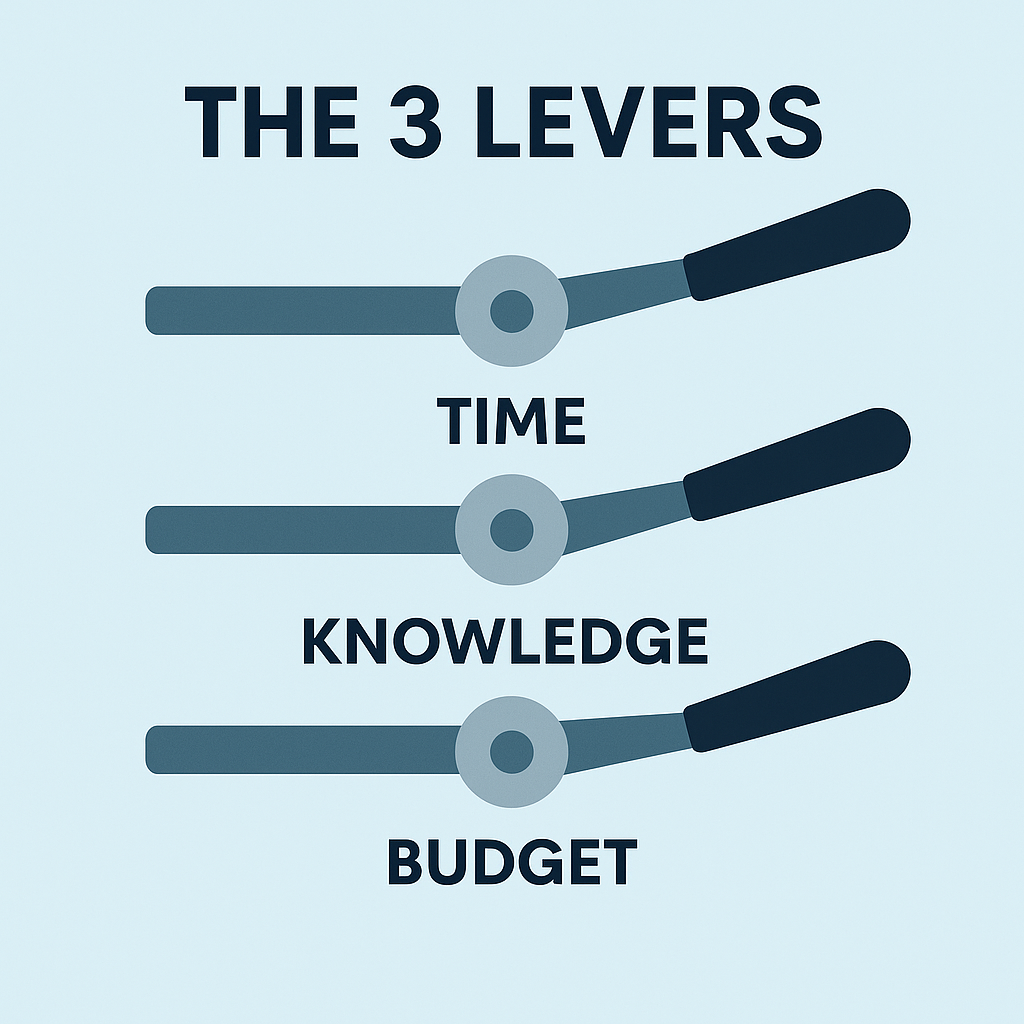If you’re a startup founder, you’ve probably Googled “digital marketing checklist” more than once, only to find long lists of tools, buzzwords, and strategies that feel a bit… not for you. This guide is different, and acknowledges your real constraints: limited time, knowledge, and budget.
Whether you’re running a café or launching a niche B2B service, this checklist will help you focus on the digital marketing skills that really matter.
Why a new kind of checklist?
Most advice out there assumes you’ve got either:
- A marketing degree
- A big budget
- Or loads of free time
If you’ve got none of the above, the Three Levers Framework helps you compensate by playing to your strengths. Have time? Use it. Have knowledge? Maximise it. Got a bit of budget? Spend it wisely.

The essential digital marketing skills (and how to approach them)
1. Content creation: build your baseline
Why it matters: This is your first impression. Content builds connection.
What you need:
- Clear, useful writing for web and socials
- Usable photos (your phone is fine)
- Short, informal videos
Three levers in action:
- Time-rich: Batch-create 3–4 weeks of posts in one go
- Knowledge-rich: Set tone/brand standards and outsource
- Budget-rich: Hire a part-time content assistant
Unique tip: Don’t aim to go viral—aim to go consistent. One post a week for 3 months is a win.
Bonus resource: The Three Levers of DIY Marketing
2. Customer research: get real insight fast
Why it matters: If you’re not asking your customers, you’re guessing.
What you need:
- Open-ended question skills
- Polls or quick surveys (e.g. Instagram Stories)
- Ability to spot feedback patterns
Three levers in action:
- Time-rich: 10-min weekly chats with real customers
- Knowledge-rich: Turn notes into customer personas
- Budget-rich: Hire someone to collect testimonials or run paid surveys
Unique tip: Create a “Voice of the Customer” folder and save real feedback (with permission).
3. Analytics: knowing what’s working
Why it matters: You need to know what’s moving the needle.
What you need:
- GA4 or basic Google Analytics setup
- Understanding key metrics (traffic, bounce rate, conversions)
- UTM link tracking
Three levers in action:
- Time-rich: Watch free YouTube tutorials and check metrics weekly
- Knowledge-rich: Build a simple reporting habit
- Budget-rich: Pay someone to run monthly reports
Unique tip: Create a one-page “Marketing Scorecard”. Just five metrics. No fluff.
4. Email and CRM: own your audience
Why it matters: Email outperforms social in ROI—every time.
What you need:
- Write welcome and nurture emails
- Segment customers by type
- Set up basic automations (e.g. abandoned cart emails)
Three levers in action:
- Time-rich: Manually build your list from past customers
- Knowledge-rich: Create a lead magnet that gives real value
- Budget-rich: Use MailerLite or Klaviyo with help from a freelancer
Unique tip: A 100-person list that opens is more valuable than a 10,000-person list that doesn’t.
Resource: Smart marketing budget for micro-business
5. Local SEO and listings: get found without ads
Why it matters: People search with intent. You want to be found.
What you need:
- Optimise your Google Business Profile
- Encourage and manage reviews
- Use sector-specific directories
Three levers in action:
- Time-rich: Set aside a day to tidy your listings
- Knowledge-rich: Use structured data and local keywords
- Budget-rich: Hire a local SEO consultant
Unique tip: Post fresh photos to your Google listing weekly—it boosts visibility.
Further reading: Traditional marketing not working for independent shops?
6. Campaign planning: tie it all together
Why it matters: Random posts don’t build momentum. Campaigns do.
What you need:
- Map out seasonal campaigns
- Coordinate emails, posts, and promotions
- Review what worked (and what didn’t)
Three levers in action:
- Time-rich: Use a wall calendar or Notion board
- Knowledge-rich: Refine based on past results
- Budget-rich: Hire a strategist for quarterly planning
Unique tip: Plan backwards. Start with the result you want, then map the steps to get there.
7. Ad testing: spend small, learn fast
Why it matters: Ads aren’t a strategy—they’re a test.
What you need:
- A clear, offer-based ad
- One test audience
- Understand cost-per-click and conversions
Three levers in action:
- Time-rich: Run a £5/day test campaign
- Knowledge-rich: Split test headlines and images
- Budget-rich: Hire a performance marketer
Unique tip: Start with retargeting ads—better ROI, faster learning.
Final thoughts: don’t do it all at once
No one’s expecting you to master all seven areas overnight. Look at your Three Levers. Start where your strengths lie.
If in doubt? Start with content. It’s your shop window. Build consistency before complexity.
And when you’re ready to go deeper, nfkdigital.com is packed with tools, research, and real-world examples for founders like you.